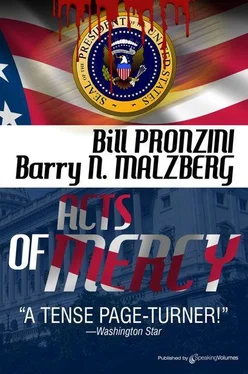Bill Pronzini - Acts of Mercy
Здесь есть возможность читать онлайн «Bill Pronzini - Acts of Mercy» весь текст электронной книги совершенно бесплатно (целиком полную версию без сокращений). В некоторых случаях можно слушать аудио, скачать через торрент в формате fb2 и присутствует краткое содержание. Жанр: Триллер, на английском языке. Описание произведения, (предисловие) а так же отзывы посетителей доступны на портале библиотеки ЛибКат.
- Название:Acts of Mercy
- Автор:
- Жанр:
- Год:неизвестен
- ISBN:нет данных
- Рейтинг книги:4 / 5. Голосов: 1
-
Избранное:Добавить в избранное
- Отзывы:
-
Ваша оценка:
- 80
- 1
- 2
- 3
- 4
- 5
Acts of Mercy: краткое содержание, описание и аннотация
Предлагаем к чтению аннотацию, описание, краткое содержание или предисловие (зависит от того, что написал сам автор книги «Acts of Mercy»). Если вы не нашли необходимую информацию о книге — напишите в комментариях, мы постараемся отыскать её.
Acts of Mercy — читать онлайн бесплатно полную книгу (весь текст) целиком
Ниже представлен текст книги, разбитый по страницам. Система сохранения места последней прочитанной страницы, позволяет с удобством читать онлайн бесплатно книгу «Acts of Mercy», без необходимости каждый раз заново искать на чём Вы остановились. Поставьте закладку, и сможете в любой момент перейти на страницу, на которой закончили чтение.
Интервал:
Закладка:
He smiled at Claire as they neared U.S. Car Number One, to let her know he felt cheered, but her answering smile was preoccupied and mechanical. Her mood had matched his in the past eighteen hours: withdrawn, silent, morose. Which was not like her at all, though understandable in the circumstances. Neither of them had mentioned Briggs since he had conveyed Justice’s report to her; and neither of them had slept much last night, nor on the flight from Washington this morning.
When they reached the portable metal steps Augustine turned briefly to wave at the gaggle of photographers and reporters that had followed onto the station platform. Flash. bulbs popped; television cameras whirred. From out at the front of the station he could hear the voices of the wellwishers who had gathered to greet him when his limousine arrived from the airport-a much smaller crowd than even on his last visit ten days ago. But that would change once he got his campaign into full swing. They would come in droves then, as they had four years ago; all over the country they would come out in droves when the Presidential Special came whistling in.
He noticed Justice standing a few feet away, looking as unobtrusive as always but with dark smudges under his eyes that said his night had also been mostly sleepless. They had exchanged but a few words this morning and none at all since leaving Washington; everything that needed to be said about Briggs had been spoken last night, and any further dialogue at this time would have been painful for both of them.
Augustine stood a moment longer, smiling impersonally for the cameras, sniffing the good oily machine odor of railroad stations everywhere. Then he turned and helped Claire up the steps, boarded after her and followed her into the corridor of U.S. Car Number One. At the door of her compartment she stopped and turned to him, putting her hand gently on his arm.
“I think I’ll lie down for a while, Nicholas,” she said.
“Don’t you feel well?”
“I’m just tired. You ought to rest too, dear.”
“I will, a little later.”
She nodded, turned as Elizabeth Miller came up and asked her something about a secretarial matter. Augustine left her with Elizabeth and went up the empty corridor to his office at the far end. Just as he reached it, someone-Maxwell Harper-called his name. He sighed softly, glanced back and waited for Harper to approach him.
Maxwell had tried to get him alone at Dulles and again on Air Force One-plainly, he had something on his mindbut Augustine had been in no mood to listen to one of Harper’s lectures. Nor was he now, for that matter. A brilliant man, Maxwell, but you could not interact with him on an emotional level; he thought only in terms of facts and figures, causes and effects, and dry intellectual syllogisms. It was exactly for that reason that Augustine could never tell him about the Briggs decision. Harper would be appalled by it because he would be unable to see past the act itself, would be incapable of understanding the emotions which had precipitated it.
Augustine said, “What is it, Maxwell?”
“I’d like a few minutes of your time,” Harper answered in his dry precise voice.
“Everyone wants a few minutes of my time. Can’t it wait?”
Harper frowned slightly. “I suppose it can, but-” “Good. Come see me in thirty minutes or so. After we’ve gotten underway.”
Augustine pivoted away from him, not giving him the opportunity to argue, and entered the office compartment. Facing inside, he drew the door shut behind him. When he heard Harper’s steps retreating in the corridor he crossed to his desk and sank into the wide leather chair behind it.
The office was cool and dark: the Presidential Special was air conditioned, and the shades were already drawn across the windows. He sat quietly for a time, looking at the mahogany-paneled walls with their colorful display of railroad timetables and handbills and chromolithograph posters, the tufted red-velvet settee which had originally graced a Pullman drawing room on the old Erie Railroad in the 1880s, the hand-crafted bar cabinet from the Central Pacific car that had once belonged to Leland Stanford, the six-foot mahogany conference table with its satin-damask-upholstered chairs. God, it’s good to be back here, he thought, and smiled to himself, and felt again the stir of excitement. There was something about trains that got into a man’s blood, filled him with a sense of joy and adventure, sharpened his awareness of externals and of himself. And as he had many times before, he felt a fleeting wistful sadness that he had not ignored his father’s wishes and had gone into railroading instead of politics. If he had gone into railroading, who was to say that he would not be a happier and more fulfilled man than he was today?
He began to hum “John Henry,” and as soon as he did that he had a vivid mental image of a huge black man swinging a ten-pound sheep-nose hammer in the heat and the smoky darkness of a mountain tunnel in West Virginia, the Big Bend tunnel on the C amp;O road more than a century ago. John Henry, driving drills into bare rock to make holes for the blasting charges, risking death from silicosis and suffocation and falling rock and cave-ins, finally dying not from any of these but from sheer exhaustion in an impossible confrontation with a steam drill. John Henry, steel-driving man.
When John Henry was a little baby,
Sittin’ on his daddy’s knee,
Point his finger at a little piece of steel,
Say, “Hammer’s gonna be the death of me,
Lawd, Lawd,” say, “Hammer’s gonna be the death of me.”
Augustine sang a second verse, and in the middle of a third the Presidential Special’s air horn sounded to announce departure-sounded loud and harsh and toneless, nothing like those grand old whistles of yore. Humming again, he stood and went to the bar cabinet. He had wanted a drink badly last night, after Justice had first left the Oval Study, but he had restrained himself; the worst time to reach for alcohol was when you were in the middle of a crisis. But a drink or two now would not hurt. In fact, they were called for: a toast to railroading and to the memory of steel-driving men like John Henry.
While he was making himself a bourbon-and-soda, the train started to move-slowly, smoothly, the iron wheels creating small rhythmic sounds on the rails. Augustine raised his glass, drank from it, and then returned to his chair and lifted the shade on the nearest window. Outside, the network of tracks and strings of out-of-service cars slid by, shining in the hard glare of the sun; then they were gone and in their place were buildings and palm trees and the distant bluish shadows of hills and mountains.
He smiled again and sang:
O the cap’n he told John Henry,
“I believe this mountain’s sinkin’ in”;
John Henry he say to his cap’n, “O my,
It’s my hammer just a-hossin’ in the wind,
Lawd, Lawd, it’s my hammer just a-hossin’ in the wind.”
The train picked up speed and the air horn echoed again, and Augustine experienced a familiar illusion of motionlessness, as if the Presidential Special were standing still and the world itself were rushing by. There was a curious sense of peace in that. He could imagine, at least for a while, that he had been relieved of the pressures of office, that the complexities of human society were under the influence of God alone.
He filled a pipe, settled back with it and with his drink. I wish I’d known you, John Henry, he thought. I think we’d have gotten along. Yes, by God, I think we’d have gotten along just fine.
Two
Now, here on the train as it moves away from Union Station, an understanding comes to us: the execution of Briggs was our first act of mercy, but it must not be our last.
Читать дальшеИнтервал:
Закладка:
Похожие книги на «Acts of Mercy»
Представляем Вашему вниманию похожие книги на «Acts of Mercy» списком для выбора. Мы отобрали схожую по названию и смыслу литературу в надежде предоставить читателям больше вариантов отыскать новые, интересные, ещё непрочитанные произведения.
Обсуждение, отзывы о книге «Acts of Mercy» и просто собственные мнения читателей. Оставьте ваши комментарии, напишите, что Вы думаете о произведении, его смысле или главных героях. Укажите что конкретно понравилось, а что нет, и почему Вы так считаете.












